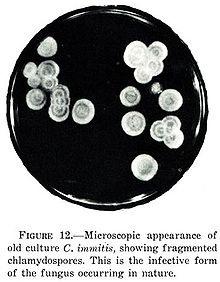球孢子菌屬
外觀
| 球黴菌屬 | |
|---|---|

| |
| 粗球黴菌 | |
| 科學分類 | |
| 界: | 真菌界 Fungi |
| 門: | 子囊菌門 Ascomycota |
| 綱: | 散囊菌綱 Eurotiomycetes |
| 目: | 散囊菌目 Eurotiales |
| 科: | 爪甲團囊菌科 Onygenaceae |
| 屬: | 球黴菌屬 Coccidioides G. W. Stiles (1896)[1] |
| 模式種 | |
| 粗球黴菌 Coccidioides immitis G. W. Stiles (1896)
| |
| 種 | |
|
見正文 | |
| 異名 | |
| |
球孢子菌屬(學名:Coccidioides)是子囊菌門爪甲團囊菌科的一個屬,最早於1892年由阿根廷醫師亞歷杭德羅·波薩達斯在一名被感染的軍人身上樣本中觀察到,1986年Gilchrist與Rixford將致病的病原取名為Coccidioides immitis(即粗球黴菌),屬名意為「與球蟲亞綱相似」。1990年Ophüls與Moffitt證明此病原為真菌而非原蟲。2002年分子序列分析結果將粗球黴菌中分出了一新種波薩達斯球孢子菌,種小名即為紀念波薩達斯[2]。
本屬物種為雙態性真菌,其中粗球黴菌和波薩達斯球孢子菌可以無性的關節孢子感染人類,造成山谷熱(球孢子菌病),為北美洲西南部的一種真菌病[3]。這兩個物種外觀與實驗室檢測的結果均相同[4],需以DNA序列分別,兩者的分佈的地理區域亦有差異,大致以蒂哈查皮山為界[5],粗球黴菌主要分佈於美國加州,在亞利桑那州與墨西哥下加利福尼亞州亦有分佈;波薩達斯球孢子菌則分佈於美國德克薩斯州、亞利桑那州、墨西哥北部和中南美洲的部分地區[6]。

下屬物種
[編輯]本屬包括以下物種:
- Coccidioides esteriformis (Cantón) M.Moore
- Coccidioides histosporocellularis (Haberf.) Vuill.
- 粗球黴菌 Coccidioides immitis G.W.Stiles, 1896
- 波薩達斯球孢子菌 Coccidioides posadasii M.C.Fisher, G.L.Koenig, T.J.White & J.W.Taylor[7]
- Coccidioides rosea Bat., H.Maia, S.K.Shome & Oliveira
參考文獻
[編輯]- ^ Rixford E, Gilchrist TC. Two cases of protozoan (coccidioidal) infection of the skin and other organs. Johns Hopkins Hospital Reports. 1896, 1: 209–268 (see p. 243).
- ^ Anonymous. Etymologia: Coccidioides. Emerg Infect Dis. June 2015, 21 (6) [2021-06-14]. PMC 4451898
 . doi:10.3201/eid2106.ET2106. (原始內容存檔於2021-06-14).
. doi:10.3201/eid2106.ET2106. (原始內容存檔於2021-06-14).
- ^ Coccidioidomycosis (Valley Fever). Centers for Disease Control and Prevention (CDC). [11 July 2013]. (原始內容存檔於9 July 2013).
- ^ Fauci, Anthony S. Harrison's Principles of Internal Medicine. New York: McGraw-Hill Medical, 2008.
- ^ Kirkland TN. The Quest for a Vaccine Against Coccidioidomycosis: A Neglected Disease of the Americas.. J Fungi (Basel). 2016, 2 (4). PMC 5715932
 . PMID 29376949. doi:10.3390/jof2040034.
. PMID 29376949. doi:10.3390/jof2040034.
- ^ Hospenthal, Duane R., and Michael G. Rinaldi. Diagnosis and Treatment of Human Mycoses. Totowa, N.J.: Humana Press, 2007, p. 296-297.
- ^ M. C. Fisher, G. L. Koenig, T. J. White & J. W. Taylor (2002) Molecular and phenotypic description of Coccidioides posadasii sp. nov., previously recognized as the non-California population of Coccidioides immitis, Mycologia, 94:1, 73-84, DOI: 10.1080/15572536.2003.11833250
